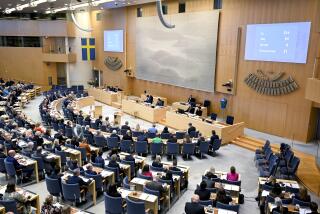Sweden: Why the ‘moral superpower’ dissented over COVID-19
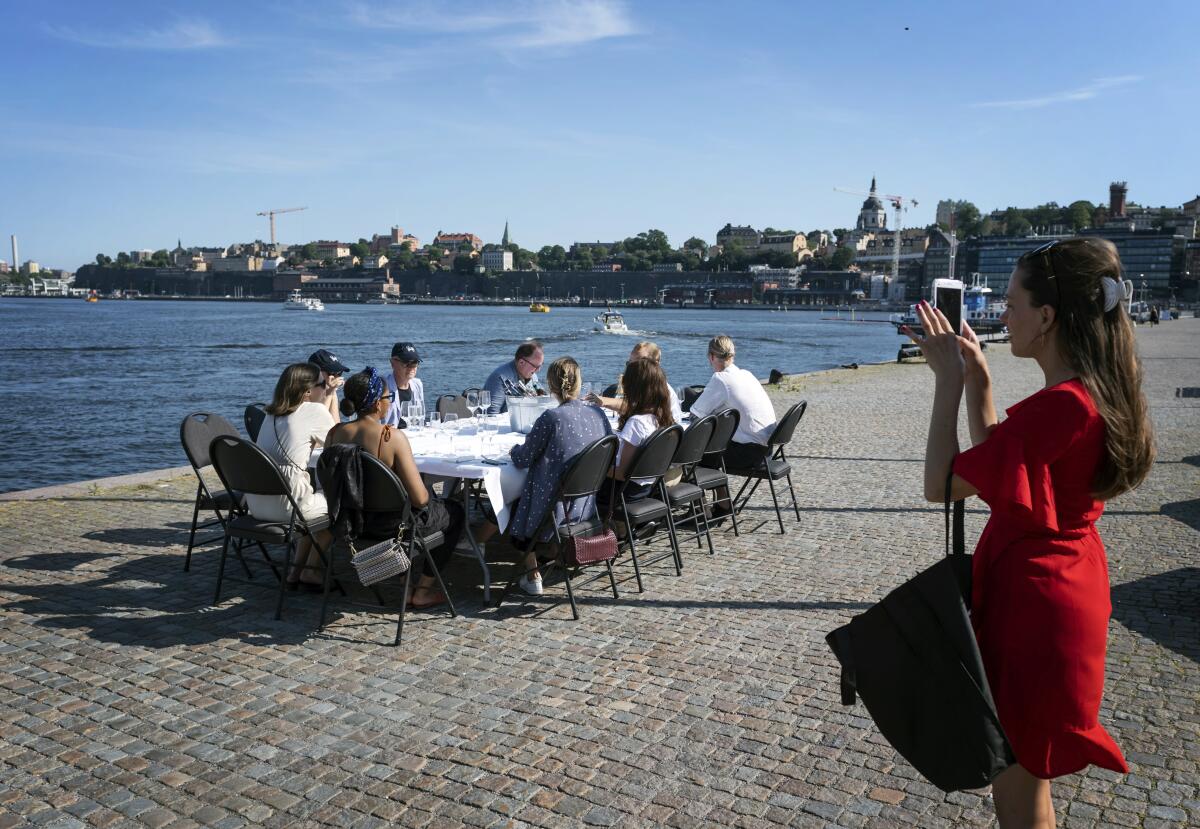
A global crisis breaks with a particular focus on Europe. Nearly all countries act in unison except for Sweden. The solo approach of the Scandinavian country sparks international headlines asking why it stands out from the crowd.
It could be a description of Sweden’s now infamous response to coronavirus and how it has avoided the formal lockdowns that the rest of Europe adopted. But it is also an account of what happened during the 2015 migration crisis when it accepted more asylum applications than any other EU country relative to the size of its population.
“It’s striking that Sweden has taken a very different path [from others] on two international crises in the past five years,” said Nicholas Aylott, associate professor of political science at Sodertorn University. “It is a case of true Swedish exceptionalism.”
That this rich Nordic country of 10 million people has stood out during the past two big international crises is striking. But is there anything that links its responses to the refugee crisis and COVID-19, making it Europe’s odd man out?
Experts put forward a host of reasons but at the core is a sense that, despite its size, Sweden is a “moral superpower” that seeks to act rationally, whereas it perceives the behavior of other countries to be based on political calculations or emotions. That status is deeply rooted in Sweden’s long-held neutrality — it has not fought a war for more than two centuries — but political scientists say it can lead to it being slow to react.
“We have been at peace for so many years. Sweden has not had very big crises through history so we’ve been in our little romantic world where everything is fine,” said Jenny Madestam, a political scientist at Sodertorn University. “We are in a sense naive in that big crises will not happen to us — people say Sweden is a good country and will come out of [such crises] well.”
Peter Wolodarski, editor of the liberal newspaper Dagens Nyheter, said in both cases Sweden’s position was not built on a thorough plan but rather it improvised an explanation for its policy. In the case of COVID-19, it avoided formal restrictions and relied on individual responsibility to achieve behavioral changes. From a lack of formal lockdown to very limited use of face masks, the man in charge of Sweden’s coronavirus response — state epidemiologist Anders Tegnell — has insisted he is following the scientific evidence while other countries take decisions for more political reasons.
“It suits the image we have in this nation of being different and ‘superior.’ We [tell ourselves that we] have better ideas than others, in Sweden. We are an extremely secular nation where rationality is perceived as a higher value. If you want to argue for something you say rationality is on our side,” said Wolodarski, a skeptic of Tegnell’s approach, “even though it is not true that the science is clear-cut on our side.”
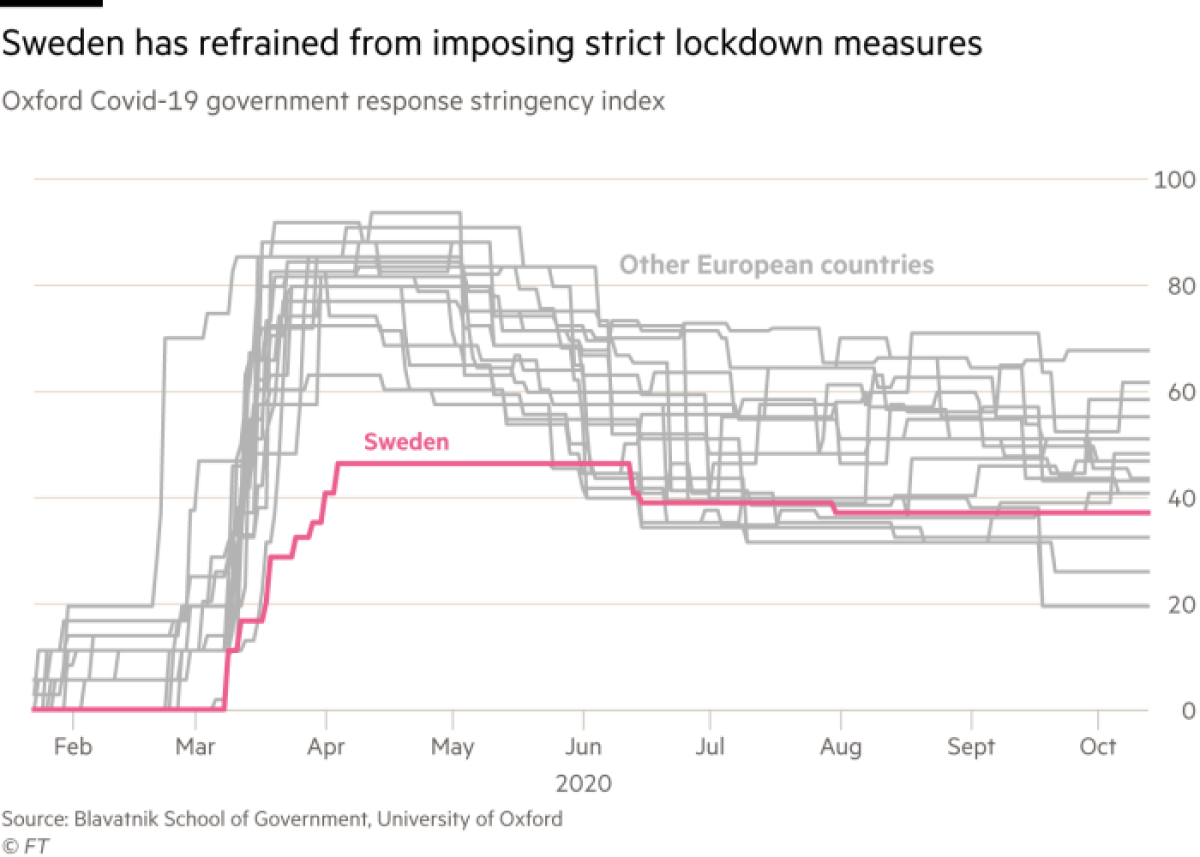
Overblown concerns
The world’s fascination with Sweden’s approach to the pandemic has seemed almost endless. As country after country imposed lockdown restrictions on their populations rarely seen outside wartime, Sweden became a symbol of the debate around how to achieve population immunity. “Sweden was right,” was the pithy judgment of Tesla founder Elon Musk on Twitter this week, reflecting strong support from some U.S. libertarians for its approach.
Sweden’s goal was never to suppress the virus entirely but merely to ensure its healthcare system could cope while the broader health of the population was not forgotten. It may not have had a legally enforced lockdown, but a combination of a culture of consensus and strong trust in authorities meant that most people chose to work from home and avoid close social contact.
Other countries appeared to try to emulate Sweden — particularly Britain at the beginning of the pandemic — but caved in to intense public pressure amid a rising death toll. In Sweden, 5,900 people have died with coronavirus, giving it a per capita death rate about 10 times higher than neighboring Finland and Norway.
Domestic criticism of its approach has been relatively muted, with the public health agency and Tegnell enjoying strong support. Although that backing has weakened slightly in recent months, most of the criticism still comes from outside the country.
“Sweden has a collectively high self-confidence when it comes to how to organize society for everyone’s best, where both politicians and citizens have deep faith in government authorities,” said Jonas Ludvigsson, professor of clinical epidemiology at Karolinska Institute in Stockholm. “There was almost a confidence à la [German chancellor, Angela] Merkel that ‘yes, we can do this.’”
In 2014 and 2015, Sweden again stood out. As large numbers of asylum seekers came to Europe, most countries tried to close their borders. Some such as Germany took in large numbers but Sweden accepted more per capita than any other EU country. The then center-right Swedish prime minister, Fredrik Reinfeldt, urged Swedes “to open their hearts” to refugees just before national elections in 2014. His administration was replaced by a center-left government, which retained the policy throughout 2015 even as other countries cracked down.
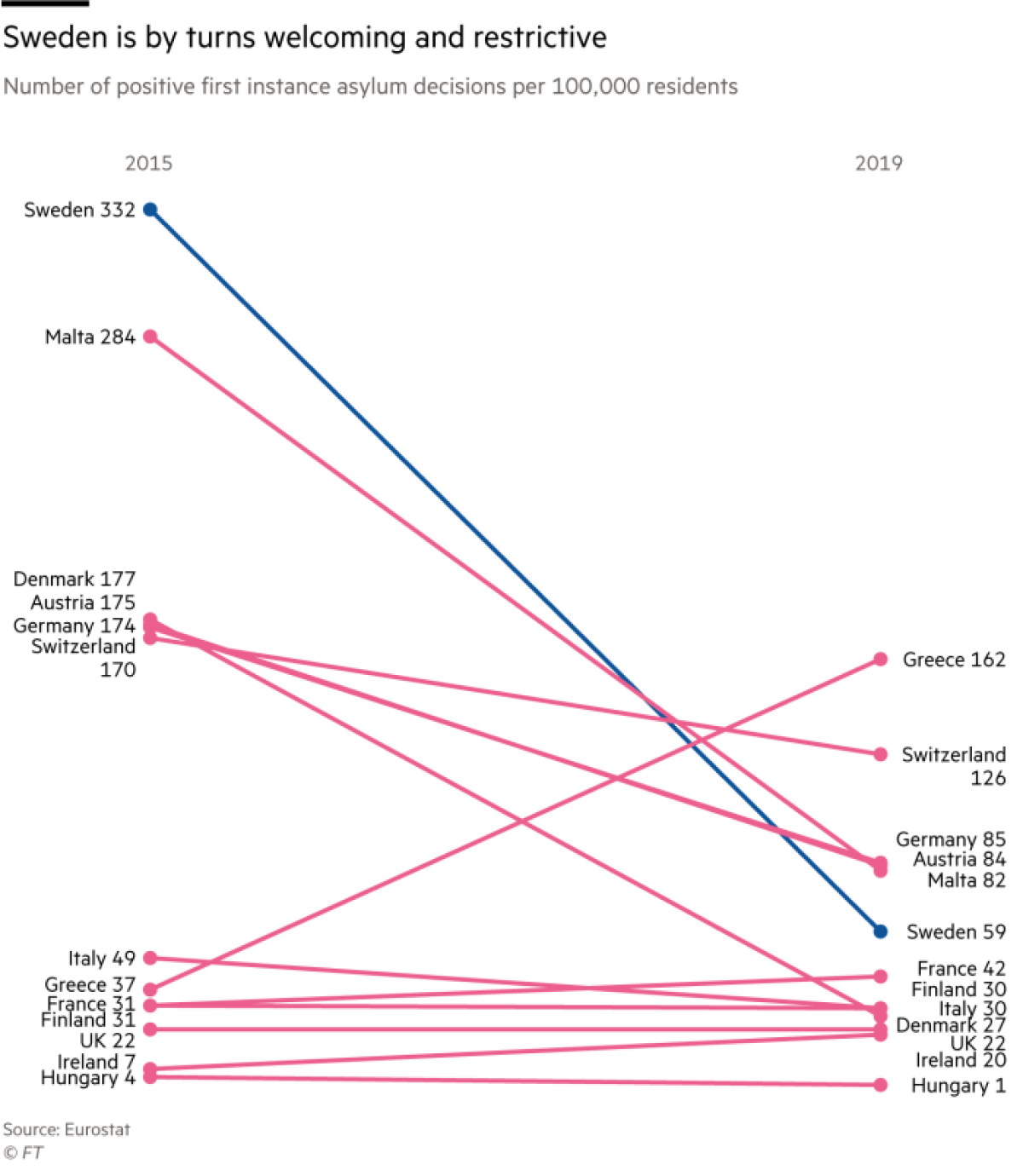
Amid heavy internal pressure from the anti-immigrant Sweden Democrats, as well as close international scrutiny, Sweden did eventually give in, imposing its own restrictions in November 2015 as prime minister Stefan Lofven admitted it was “an untenable situation.” Asylum applications fell to 22,000 in 2019 from their peak of 163,000 in 2015.
Many of those who have praised Sweden’s “freedom-loving” strategy on coronavirus were the same people aghast at its liberal immigration policy in 2015. Some in Sweden see little to link the two. But for others there are more subtle ties.
Tegnell told the Financial Times in August that the concerns around both crises may be overblown: “The migration crisis wasn’t really a crisis. We absorbed those people and, of course, we are not the best country in the world in integrating them and, of course, they are still a problem. But it’s not a major problem. The economy went on living. The housing situation did not change very much.”
Asked if he thought coronavirus would be similar, he replied: “I’m quite clear about that. My role will last for another five or six months and will then fizzle out, I’m sure.”
‘Moral superpower’
For others, there are deeper explanations. Wolodarski argued that part of the answer goes back to what he describes as Sweden’s “dubious” position in the second world war. He argued that Sweden stuck to its neutral status in the war — although at times it helped Nazi Germany as well as the Allies — for “pragmatic reasons, not ideology.” However, when the help to Germany was questioned by historians and some Swedes, Wolodarski said neutrality “became injected with moral overtones.”
He added: “We had to explain why Sweden chose this path: we were different from other countries. When you think of the refugee crisis and coronavirus, moments when Sweden stood out, it’s not new for us. People are quite proud of it.”
Sweden stands out for its values. The World Values Survey measures countries on whether they favor traditional values of religion and family or secular-rational ones; and whether they incline to survival values that stress economic and physical security or modes of self-expression that highlight issues such as environmental protection and tolerance of foreigners and LGBTQ people. Sweden has the highest score for self-expression values and almost the highest for secular-rational ones. “We are actually extreme in many ways,” said Ludvigsson.
Some see a combination of the history and values in both recent crises. Johan Strang, associate professor in Nordic studies at the University of Helsinki in Finland, said Sweden’s bad conscience over the second world war “translated into the idea of becoming a moral superpower.” That in turn meant that Swedish politics often revolved around ideological debates rather than more practical matters in neighbors such as Finland.
“Swedes have these ideals and this sense of being ahead of time, in the vanguard of human development. They need to solve every issue for the sake of all humanity,” he added.
Madestam said at the heart of Sweden’s values is a paradox: “On the one hand, we have a very strong state that is always taking care of the individual; but at the same time, this very strong state has an idea that we should be independent and take individual responsibility for our lives.”
For coronavirus, that translated into no national lockdown but pressure on each individual to accept responsibility and keep their distance from each other. “It’s up to you. It’s your freedom to choose how you behave,” she added.
Another factor, say critics, is that Stockholm often appears slow to react to crises. Sweden was the hardest hit of all European countries by the 2004 Asian tsunami which killed almost 550 Swedes, mostly in Thailand. But the government was heavily criticized by both an independent report and families for its slow response.
Ludvigsson said being slow is simply the “price you pay for not overreacting.” He added: “Many times, that is a good thing. You can’t overreact to everything. But it also means that you’re a bit slow in reacting when you need to.”
Others argue that Sweden’s history as one of the world’s most peaceful countries — it last took an active part in a war in 1814 — means that it is often poorly prepared for crises.
When coronavirus struck, Finland was able to tap its emergency supplies of medical equipment and fall back on laws planned for a possible pandemic while Sweden had to scramble with other countries to get masks and give its government the powers it needed. Asked whether the long time without war had affected Sweden’s character, Tegnell replied: “At least [in] the attitude to the importance of preparedness. There is something there.”
The state epidemiologist long played down the likelihood that Sweden would be hard hit by COVID-19, claiming in early March that the outbreak had already peaked. As other countries such as Norway and Denmark rushed to protect care homes for the elderly, Sweden only introduced a ban on visits in April when the virus had already entered many establishments. In 2015, it was only when overstretched Swedish municipalities warned that vital services were at risk — and long after other countries had acted — that Sweden’s government imposed immigration restrictions.
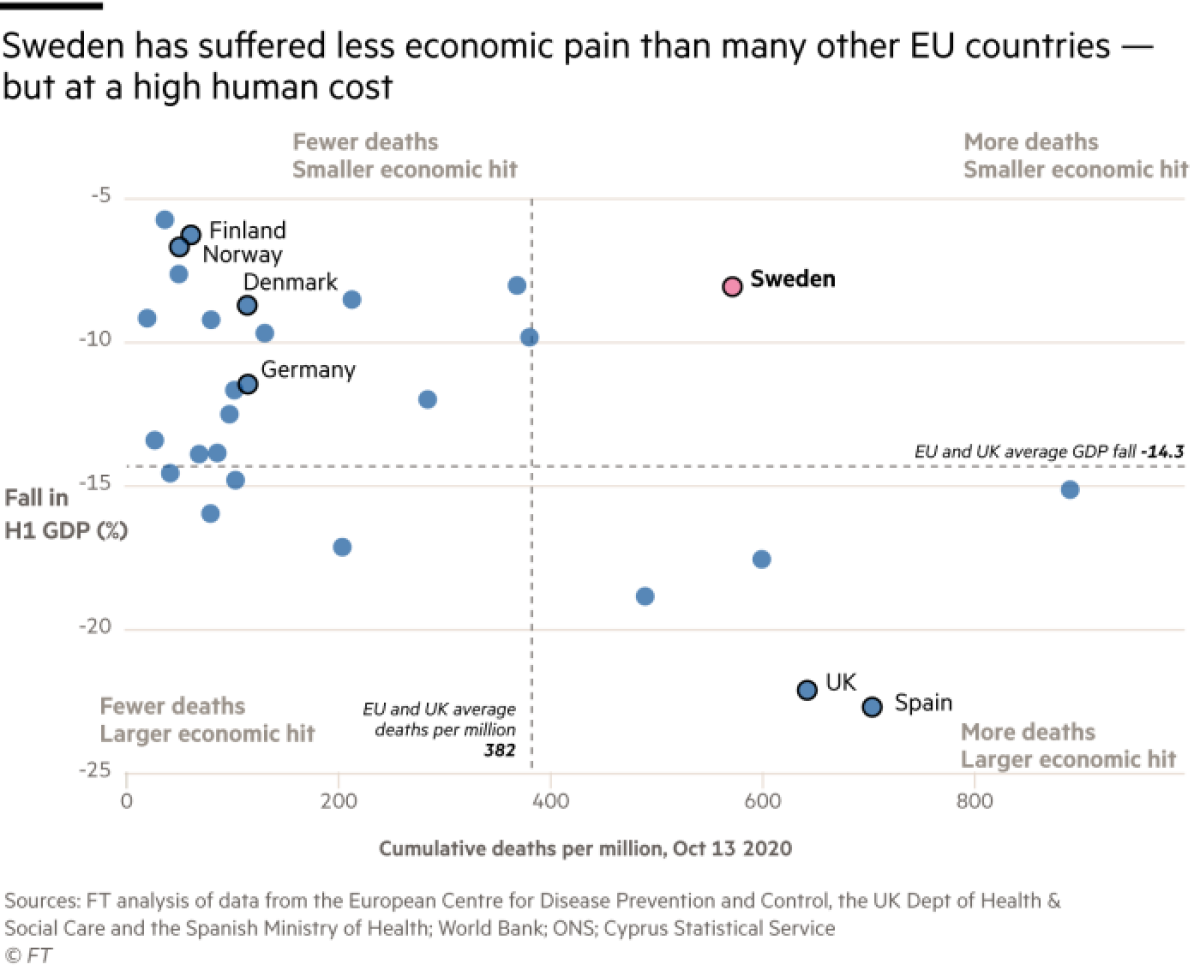
Independent minds
The significant power, under Sweden’s constitution, given to independent agencies — which work at arm’s length from government — also helps to explain decisions taken in 2015 and 2020. If the Migration Agency wielded influence in 2015, its public health counterpart has been even more central to Sweden’s coronavirus approach. “The consequence of this is that the agencies are very strong and they decide on their own how to handle crises,” said Madestam.
It means that the decision makers are more insulated from public or political pressure than in other countries where politicians call the shots. But it has led to heavy criticism of the government from opposition MPs, who demand more political leadership in a crisis. Mattias Karlsson, the parliamentary leader of the Sweden Democrats, told the FT in August that Tegnell was “an expert in viruses but he’s not a politician,” adding: “The government wanted to hide behind him so they couldn’t be blamed.”
Aylott said: “The room the Swedish constitution gives to independent agencies has created problems of democratic accountability.”
The approach can work as Swedes have higher trust in authorities than the citizens of most European countries. But even that is under threat. “I’m definitely afraid that Sweden is becoming a more polarized society and with less trust than 20-30 years ago. It actually worries me very, very much,” said Ludvigsson.
Another link that ties 2015 and 2020 together is the government of Lofven. The prime minister was a trade unionist before becoming head of the Social Democrats in 2012. “Policy doesn’t interest him, he doesn’t seem to want to lead . . . It means that Swedish policymaking is so out of kilter with Swedish and European public opinion sometimes,” Aylott said.
Wolodarski argued that Sweden can eventually change course on coronavirus but is unlikely to acknowledge it got anything wrong — as in 2015 with immigration. As cases rise again, the Swedish public health agency is considering the possibility of localized measures such as warnings to avoid public transport and shopping centers, as well as social contact with members of other households, bringing it closer to the approach of other countries but still shying away from legal restrictions.
“It is typical for Swedes,” said Wolodarski. “We pretend we have always been rational, but we change. Sweden is great at changing things. We are very flexible and very pragmatic.”
© The Financial Times Ltd. 2020. All rights reserved. FT and Financial Times are trademarks of the Financial Times Ltd. Not to be redistributed, copied or modified in any way.
More to Read
Sign up for Essential California
The most important California stories and recommendations in your inbox every morning.
You may occasionally receive promotional content from the Los Angeles Times.


